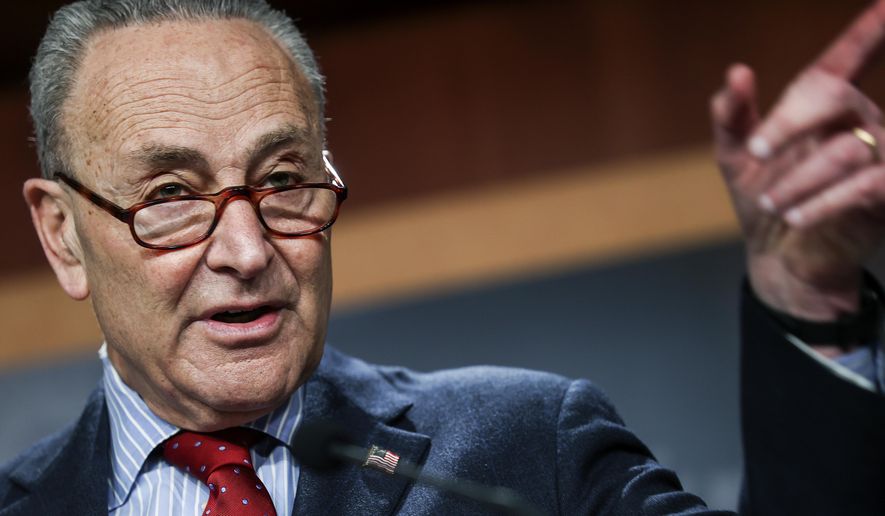Senate Majority Leader Charles E. Schumer is maneuvering to pass a third bill this year using budget reconciliation, an obscure procedure that sidesteps the filibuster and lets Democrats ram through President Biden’s agenda without the support of a single Republican.
Mr. Schumer, New York Democrat, is proposing to expand the budget reconciliation process, which allows Congress to pass spending, revenue and debt measures with a simple majority of 51 votes.
Reconciliation measures are not subject to the filibuster, a Senate rule that requires most legislation to clear a 60-vote hurdle to survive. The process has become the Democrats’ favored route for scoring legislative wins in a chamber split 50-50 between the parties.
The downside of reconciliation is it generally can be used only once per fiscal year, according to the Congressional Budget and Impoundment Control Act of 1974.
An unusual chain of events gave the Democrat-led Senate two bites at the reconciliation apple this year. If Mr. Schumer’s gambit succeeds, then they will get a third.
That possibility has some political observers concerned.
“It is hugely irresponsible for Schumer to consider undermining the few remaining rules that might bring discipline to federal budgeting,” said Chris Edwards, director of tax policy studies at the libertarian Cato Institute. “The reconciliation rules were created to reduce deficits, but both parties have been using them to vastly increase deficits. It’s perverse.”
Earlier this year, Democrats used the process this year to enact the American Rescue Plan, President Biden’s $1.9 trillion coronavirus relief effort. Because congressional Democrats and President Trump were unable to agree on a budget in 2020, that legislation technically counted for the previous fiscal year. As such, Congress can use reconciliation at least once more this year.
They plan to use it to ram through an infrastructure plan costing up to $4 trillion and a package of tax increases.
Mr. Schumer and his staff say a vague clause within the 1974 budget act could give them another go at using reconciliation to push through another big spending bill with a party-line vote.
The clause states that “at any time after [a reconciliation bill] has been agreed to … and before the end of such fiscal year, the two Houses may adopt a concurrent resolution” to revise the legislation.
The majority leader said the clause would at the very least allow Democrats to do a third reconciliation bill this year. While the exact procedure remains unclear, Democrats would likely amend the American Rescue Plan to include broader federal spending measures.
Mr. Schumer’s maneuvering, an aide said, is meant “to maximize his options to allow Senate Democrats multiple pathways to advance President Biden’s … agenda if Senate Republicans try to obstruct or water down a bipartisan agreement.”
Senate Democrats have not publicly settled on what would be in their third spending bill.
It also is unclear whether the gambit will succeed. The Senate parliamentarian, a nonpartisan adviser whose job is to interpret the chamber’s rules, will have to decide whether additional reconciliation revisions are plausible under the 1974 budget act.
If successful, however, Democrats will gain another way to circumvent the filibuster.
Currently, any legislation that falls short of 60 votes dies. That reality is a daily concern for Democrats and the Biden administration, a lawmaker privately told The Washington Times.
Despite Democrats’ control of both the legislative and executive branches, the party’s hold on the Senate is tenuous. The upper chamber is split evenly between Democrats and Republicans. Democrats hold the majority thanks to the tiebreaking vote of Vice President Kamala Harris.
Given the narrow margin, Democrats have clamored for the abolition or overhaul of the filibuster in recent months.
Sen. Elizabeth Warren, Massachusetts Democrat, and other liberals say the filibuster should not stand in the way of Mr. Biden’s agenda on gun control, climate change or voting rights.
Republicans contend that without the filibuster, the Senate’s deliberative nature would be diminished and the chamber would be transformed into a majority-dominated body similar to the House of Representatives.
• Haris Alic can be reached at halic@washingtontimes.com.




Please read our comment policy before commenting.